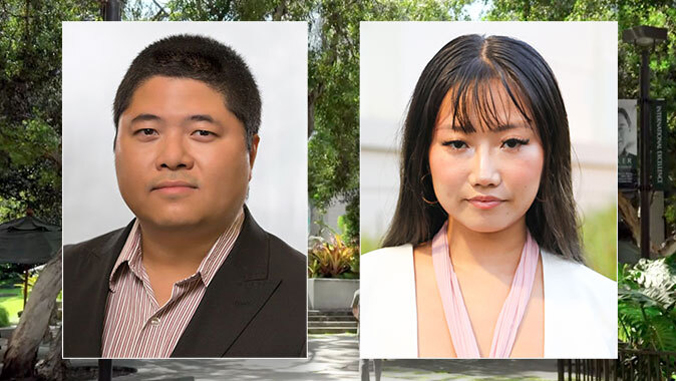This story was originally posted on Feb. 24 on UH News.
Using artificial intelligence (AI) to improve energy efficiency, and transforming waste into pre-refined biomass are a pair of projects that won pitch events in Hawaiʻi and are headed to nationals to compete for more than $400,000 in cash prizes.

Quang Loc Lam and Kunlan Yang
Quang Loc Lam, a University of Hawaiʻi at Mānoa PhDstudent in information technology management in the Shidler College of Business, created a company called “Energy AId” that uses AI to identify the pattern of energy usage in buildings and find opportunities to improve energy efficiency.
“It’s our responsibility to come up with sustainable solutions now to alleviate the burden for the next generation,” Lam said. “Using AI and other technologies, we can significantly improve energy efficiency and reduce energy costs for buildings. It’s exciting to think about the possibilities.”
Kunlan Yang, a senior undergraduate finance student, launched “ABLE,” a Hawaiʻi-based biowaste company that transforms waste from businesses such as restaurants, hotels, and farms into pre-refined biomass, which is then sold to biofuel refineries. Yang’s mission is to revolutionize the perception of food waste, serving as a comprehensive solution and driving Hawaiʻi toward its 2045 sustainability goals.
“The inspiration for this idea struck me after backpacking through Europe, where I realized there is significant value in leftover food,” Yang said. “Fueled by a passion for food and the environment, this idea uses biofuel technology to extract value from food waste and turn it into a source of renewable energy.”
National showcase
Lam and Yang are headed to nationals called the EnergyTech University Prize 2024 Student Track. They are among 225 teams from 117 schools that will compete in the competition hosted by the U.S. Department of Energy’s Office of Technology Transitions (OTT).
Over the next several weeks, the competitors will develop actionable and scalable plans for business and commercialization opportunities around high-potential energy technologies. The three-phase competition is supporting the next generation of clean energy leaders in the U.S., who have the potential for global impact on the cleantech industry. Competitors are provided with free resources, including exclusive access to OTT’s Energy I-Corps curriculum, and mentorship from industry leaders to help them hone their proposals.
Cultivating new innovators
The Pacific Asian Center for Entrepreneurship (PACE) at the Shidler College of Business serves as a collaborative hub for innovation, entrepreneurship, and knowledge exchange. Recognizing the need for innovation in the energy sector, PACE encouraged its students to participate in the Department of Energy’s national challenge. Lam and Yang, who both serve as PACE Leaders, stepped up to the challenge, put their application in and advanced to the regional pitch event. PACE Entrepreneur-in-Residence Jeff Hui is coaching the teams for the regional event, and the teams are also tapping into the network of resources offered by PACE.
“PACE is proud of these students for advancing to the regional pitch event and representing the university in this national competition,” said PACE Executive Director Sandra Fujiyama. “Activities like this provide students with valuable practical learning experiences, and showcase the innovative ideas of our students to address energy challenges locally and globally, which aligns with the Shidler College of Business’ and the university’s strategic plans.”